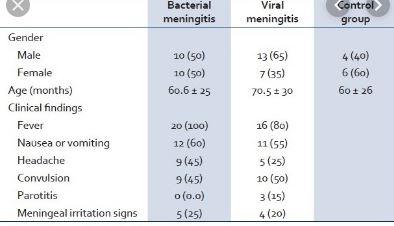What is the Difference Between Bacterial and Viral Meningitis?
Difference Between Bacterial and Viral Meningitis is that Meningitis is an acute inflammation of the membranes that cover and protect the brain and spinal cord. These membranes are called meninges. There are two main types of meningitis, depending on the causative agent: bacterial and viral meningitis. Here we explain the difference between them.
WHAT IS BACTERIAL MENINGITIS?
Bacterial meningitis is an acute inflammation of the meninges, caused by bacteria. It can be caused by different bacterial species. Examples of such species are Streptococcus pneumonia, Neisseria meningitides, Haemophilus influenzae, etc.
The symptoms of viral and bacterial meningitis are similar. The following are some of them:
- Nausea
- Threw up
- Eruption
- Fever
- Drowsiness
- Upset in bright light
- Intense headache
- Neck stiffness
- Confusion
- Irritability
Bacterial meningitis is a very serious condition that can cause serious complications, such as hearing loss, brain damage, learning disability, etc. Untreated meningitis can be fatal for the patient.
It is important to determine the bacteria that caused meningitis and begin proper treatment as soon as possible to avoid complications.
Bacterial meningitis is treated with antibiotics. Anti-inflammatory medications and vitamins are also prescribed. If necessary, analgesics can also be applied.
There are vaccines for some of the causative agents of bacterial meningitis, such as Streptococcus pneumoniae and Neisseria meningitides.
Bacterial meningitis can be fatal if it is not diagnosed in time, if it is treated improperly, if the patient has a weak immune system or if there are other accompanying diseases.
The increasing adaptation and resistance to antibiotics by bacteria that cause meningitis is also a serious problem.
Bacterial meningitis is transmitted from one person to another through contact with fluids from the mouth or nose of a sick person.
WHAT IS VIRAL MENINGITIS?
Viral meningitis is an acute inflammation of the meninges caused by viruses.
There are more than 50 types of viruses that cause meningitis. The most common are echovirus, poliovirus and coxsackie. Most viruses that cause meningitis are more common in summer and fall.
The symptoms of viral meningitis are similar to the symptoms of bacterial meningitis, listed above.
In general, virus meningitis is less severe than bacterial meningitis. In most cases, no specific treatment is necessary. Most people with viral meningitis recover without special treatment within 7 to 10 days. In some cases, as in meningitis caused by herpesviruses, antiviral medications are applied.
Complications are more rare in viral meningitis, but they can occur in patients with accompanying diseases or with a weak immune system. The reason for the complication in viral meningitis may also be neglect of the disease or late diagnosis.
Viral meningitis can be transmitted from one person to another through saliva or feces.
WHAT IS THE DIFFERENCE BETWEEN BACTERIAL AND VIRAL MENINGITIS. COMPARISON TABLE.
| Characteristic | Bacterial Meningitis | Viral Meningitis |
|---|---|---|
| Definition | Bacterial meningitis is an acute inflammation of the meninges, caused by bacteria. | Viral meningitis is an acute inflammation of the meninges, caused by viruses. |
| Causative agents | Bacterial meningitis can be caused by Streptococcus pneumonia, Neisseria meningitidis, Haemophilus influenzae, etc. | There are more than 50 types of viruses causing meningitis. The most common are echovirus, poliovirus and coxsackie. |
| Treatment | Bacterial meningitis is treated with antibiotics. Anti-inflammatory products and vitamins are also prescribed to patients. For some of the bacteria, meningitis are developed vaccines. | In most cases, no specific treatment is necessary, but in more severe viral meningitis antiviral medications are applied. |
| Complications | Bacterial meningitis can cause serious complications, such as hearing loss, brain damage, learning disability, etc. Untreated meningitis can be fatal for the patient. | Complications are rare, but they can occur in patients with accompanying diseases or weak immune system. |
| Contagion | Bacterial meningitis is transmitted from one person to another through contact with fluids from the mouth or nose of a sick person. | Viral meningitis can be transmitted from one person to another through saliva or feces. |
- What is the Difference Between Hypertrophy And Hyperplasia?
- What is Difference Between Antiseptic And Antibiotic?
- What is Difference Between Homologous And Analogous Structures?
- What is the Difference Between Minerals and Vitamins?
- What is the Difference Between Exons and Introns?
